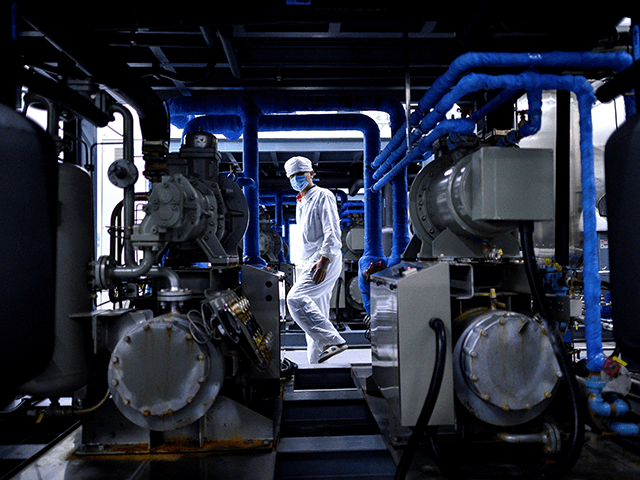CBS News on Friday published details of an upcoming 60 Minutes segment on Chinese biotech firms reportedly attempting to harvest DNA from Americans using coronavirus tests.
According to U.S. intelligence officials, a Chinese offer to build testing facilities in the United States in the early days of the pandemic was turned down based on their warnings about the security risks.
The focus of the CBS story is the BGI Group (earlier known as the Beijing Genomics Institute), a Chinese biotech firm that offered to set up coronavirus testing laboratories in Washington, New York, California, and at least three other states. The company made some smaller-scale offers to assist with coronavirus testing.
BGI produced millions of coronavirus test kits for sale around the world and was paid millions to build test labs in numerous countries, including key U.S. allies like Israel and Saudi Arabia.
The U.S. government was suspicious of the big push for Chinese testing technology, warning as far back as the spring of 2020 that Chinese companies could be seeking to harvest sensitive data from foreign customers desperate to increase their coronavirus testing capacity.
One U.S. official told Bloomberg News in May 2020 that BGI was the “Huawei of genomics,” referring to the Chinese telecom giant that has been blocked from some Western networks due to concerns about Chinese intelligence using the company’s technology to conduct surveillance and espionage. As with Huawei, BGI insists it is not owned or controlled by the Chinese government and promises its customers their personal data will be secured.
60 Minutes interviewed William Evanina, former director of the National Counterintelligence and Security Center (NCSC), who said the warnings his office issued about China’s use of coronavirus testing to collect data about foreign citizens were justified. Evanina said he was glad he was able to talk American governors out of allowing BGI to build testing labs, and he insisted that despite the company’s denials, it is linked to the Chinese Communist Party (CCP) and the People’s Liberation Army (PLA).
“We put out an advisory to not only every American, but to hospitals, associations, and clinics. Knowing that BGI is a Chinese company, do we understand where that data’s going?” he said.
Evanina and other security experts warned specifically about the danger that if China can collect tremendous amounts of medical data about Americans, including their DNA, it could be able to monopolize the production of diagnostic equipment and medicines needed to treat them, gaining increasing amounts of leverage over the U.S. population, its government, and American industry.
60 Minutes pointed out that the Wuhan coronavirus pandemic has already demonstrated how this process works, as the world has become dependent on Chinese-made protective equipment. Evanina said Chinese firms are buying up American biotech companies to gain access to their data. He also mentioned the potential threats to privacy from seemingly innocuous services like genealogy companies that use DNA testing to trace family trees – a concern that has grown serious enough for the U.S. military to instruct service members to avoid using them.
“You have probably five or six healthcare companies the last five years who have been, I would say, penetrated, exfiltrated, hacked by China. Current estimates are that 80% of American adults have had all of their personally identifiable information stolen by the Communist Party of China,” he warned.
“What happens if we realize that all of our future drugs, our future vaccines … are all completely dependent upon a foreign source? If we don’t wake up, we’ll realize one day we’ve just become health care crack addicts and someone like China has become our pusher,” FBI special agent Edward You, who has a background in biochemistry, told 60 Minutes.
Evanina made similar comments at a virtual forum hosted by the Washington Post last week, warning that China (and Russia) are using everything from economic leverage to cyber-attacks and real-world espionage to take control of the global supply chain for Chinese coronavirus vaccines.
In the course of reporting on Evanina’s remarks, the Hill cited several recent reports that illustrated how aggressively the world’s bad actors are trying to get their hands on medical data and DNA:
Tonya Ugoretz, the FBI’s deputy assistant director of the Cyber Readiness, Outreach, and Intelligence Branch, said last month that “nation state adversaries” were “combining cyber with using more traditional espionage and human sources to try to penetrate organizations” involved in the manufacturing and distribution of COVID-19 vaccines.
Her comments came after The Wall Street Journal reported in December that North Korean hackers had attempted to hack into at least six pharmaceutical groups in the U.S. and the United Kingdom involved in developing the COVID-19 vaccine, including Johnson & Johnson and Novavax.
IBM subsequently released a report warning that a “global phishing campaign” was targeting the cold storage portion of the COVID-19 vaccine supply chain, with the Cybersecurity and Infrastructure Security Agency (CISA) putting out a joint alert urging groups involved in vaccine transport and storage to be on guard against cyberattacks.
The Chinese government is reportedly frantic to collect DNA from its own citizens, without giving any reasonable explanation for why it needs such extensive data. The effort began, as much Chinese surveillance tech does today, among the oppressed Uyghur Muslims of Xinjiang province, but it quickly spread across the country, with an emphasis on harvesting DNA from Chinese men.
“Matched against official family records, surveillance footage or witness statements in police reports, these samples will become a powerful tool for the Chinese authorities to track down a man or boy – or, failing that, a relative of his – for whatever reason they deem fit,” warned medical ethicist James Leibold in a July op-ed for the New York Times.

COMMENTS
Please let us know if you're having issues with commenting.